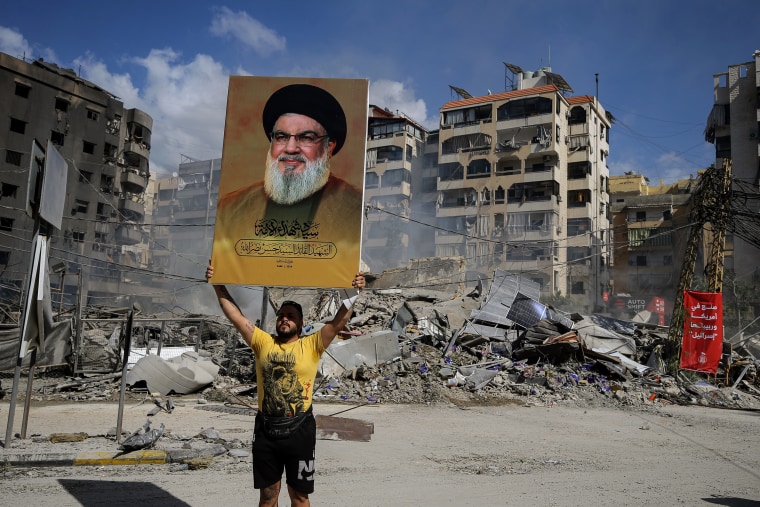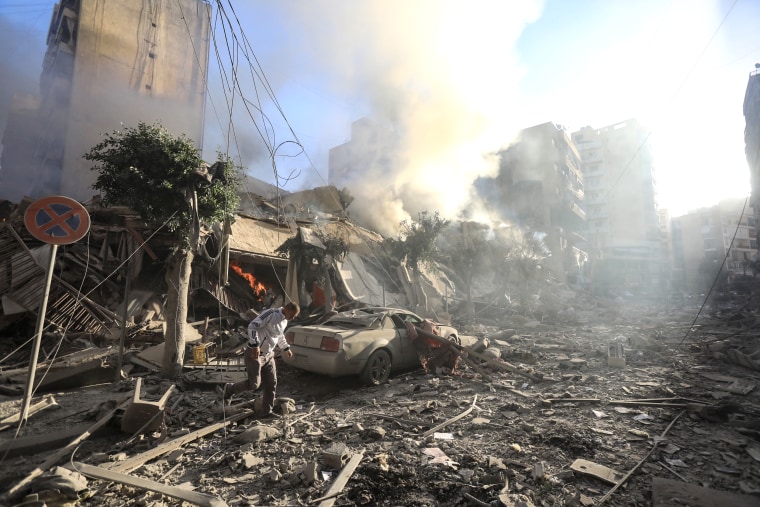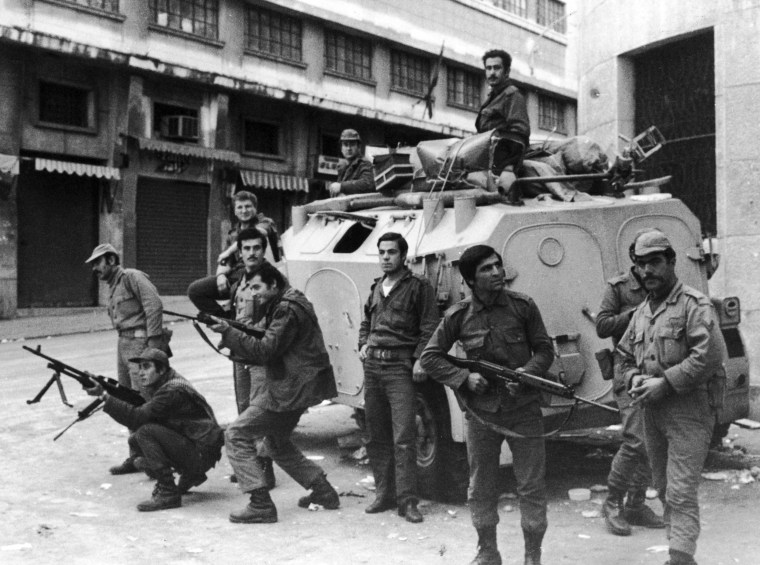BEIRUT — The dust is still settling after Israel’s recent assassinations of senior Hezbollah officials in Lebanon, including its powerful secretary general, Hassan Nasrallah a week ago.
But as Israel continues to bomb central Beirut and proceeds with a ground incursion in southern Lebanon, politicians are already starting to imagine a new kind of country rising from the ashes — a nation with effective institutions, a single, powerful army and a dynamic democracy unfettered by sectarianism.
“This is a failed state. The state has been hijacked, hijacked for quite some time by Hezbollah. And behind it Iran,” Fouad Siniora, who was Lebanon’s prime minister during the last major war between Hezbollah and Israel in 2006, told NBC News in a phone interview this week. “We have to get back to having a functioning government.”
Lebanese and American politicians are already making moves: Earlier this week a diverse group of Lebanese factions announced their intention to elect a “consensus president who will reassure everyone and dispel their concerns” and Axios reported Friday that the Biden administration hopes to use Hezbollah’s weakness to “push for an election of a new Lebanese president in the coming days.”
For the past two years, Nasrallah and Hezbollah have also blocked the election of a president who wasn’t allied with the group. So Lebanon has gone without one — a leadership vacuum that has hamstrung the passage of new legislation and much-needed economic reforms.
Even before Hezbollah invited a war with Israel for the second time in 20 years by firing thousands of rockets across Israel’s northern border in solidarity with Hamas after the Oct. 7 terror attacks, the group was widely blamed for several high-profile assassinations.
A United Nations-backed international court convicted three Hezbollah members for their roles in the 2005 assassination of Prime Minister Rafik Hariri. However, judges concluded that there was no evidence linking the group’s leaders to the killing.
And leaders in the group reportedly tried to block investigations into the cause of Beirut’s massive port explosion in 2020 that killed 218 people and injured more than 6,000.

But the risks of Hezbollah’s decline are also huge. While some Lebanese believe Hezbollah hijacked Lebanon’s political system, it also held it up. Lebanon’s fragile democracy, which is carefully apportioned among a kaleidoscope of 18 different officially recognized religious groups, could be crushed by the gradual collapse of its most powerful political and military behemoth.
While it lost its majority in the 2022 election, Hezbollah held onto 62 of the 128 seats in the Lebanese Parliament, retaining its status as a major player, and it remains the most important political outlet for the country’s Shia Muslims, one of its largest sectarian blocs.
Lebanon has already suffered a year of lower-level fighting between Israel and Hezbollah along its southern border. But in the past two weeks, that has exploded into a full-on conflict creating a population of internally displaced people that the government estimates could number around 1 million.
Even before that, Lebanon had endured five years of financial crisis and more than 10 years of an influx of more than a million refugees from neighboring Syria.
“There are lots of symptoms that we can already observe about the failure of social cohesion or national unity in Lebanon that’s already very fragile,” said Sarah Zaaimi, an expert on Lebanon at the Atlantic Council’s Rafik Hariri Center & Middle East programs.
The current cocktail of foreign refugees, internally displaced people, financial and political instability and an Israeli ground invasion is redolent of “a lot of flavors that remind us a lot of what was happening in the 70s” before Lebanon’s 15-year-long civil war, she said.
That war ended with the Taif Agreement, which was reached in 1989 and also solidified the sectarian nature of Lebanon’s government, while at the same time allowing the country to persist as a relatively stable if repeatedly gridlocked democracy.

Even if Hezbollah were to completely disappear, the sectarian electoral system is unlikely to disappear with it, said Firas Maksad, a Lebanon expert at the Middle East Institute, a Washington-based think tank. But Lebanese political leaders are still relishing Hezbollah’s decline, he said, even some among the group’s Shia Muslim co-religionists.
“There’s a void that was left behind by a much-degraded Hezbollah and the local parties are going to be looking to take advantage,” he said. “But they can’t say so publicly and they can’t call on Israel to keep going.”
Maksad cited the example of Israel’s 2006 war with Hezbollah, during which Nabih Berri, a Shia Muslim, the longtime speaker of Parliament, publicly supported the Shia militia, but privately told Jeffrey Feltman, U.S. ambassador at the time, to allow Israel to keep pummeling the group, according to classified cables revealed by WikiLeaks.
“[Berri] suggested in a most oblique manner that the potential for Israel’s assault to weaken Hezbollah militarily and undermine the organization politically is a positive development,” the July 17, 2006, leaked cable read. “For the leader of a community that has by virtue of its physical location borne the brunt of the Israeli assault, Berri’s spirits during the meeting were remarkably high. His condemnation of ‘Israeli aggression’ against Lebanon was perfunctory at best.”
Berri's comments may have surprised fellow Shias in Hezbollah, which has long styled itself as the leader of a regionwide resistance against Israel – one that fights the Jewish state on behalf of the Lebanese people.
“When you talk about the Lebanese and how they support the resistance, you will find some people who will lay blame on the resistance,” Ibrahim Moussawi, a Hezbollah member of Parliament, said referring to his party.
He accused Hezbollah’s Lebanese critics of being “detached from history” and disputed their claims that the group fights on behalf of Iran and its interests.

Yet, support for Hezbollah — as well as opposition to it — still fall primarily along sectarian lines. Polling by The Washington Institute late last year found that 34% of Sunni Muslims and 29% of Christians expressed a positive view of Hezbollah, while 93% of Shias said they approved of the group.
Still, fractured Lebanon is fundamentally an outward looking nation. Even as politicians and leaders of confessional enclaves ponder their place in a new Lebanon in which Hezbollah is weak or absent, they are looking for cues from foreign capitals, including Washington, Paris, Tehran, Riyadh and even Jerusalem.
“They will move gently and gradually with an eye to which way the political winds are blowing,” Maksad of the Middle East Institute said. “Politicians will be testing the appetite among foreign governments and gauging “Washington’s commitment to this new political reality and Iran’s ability to regenerate.”
But even if Lebanon remains riven by sectarian divisions and vulnerable to foreign interlopers, the risks and rewards of Hezbollah’s setback — no matter how temporary — present a tantalizing opportunity for a political revival and perhaps real national unity.
“The sectarian situation, if it is properly handled and properly managed, it is a factor of richness in the country,” said Siniora, the former prime minister. “This is the way for how it should be done for a country like this — for this country that should be an example not just for the Arab region but for the world.”
